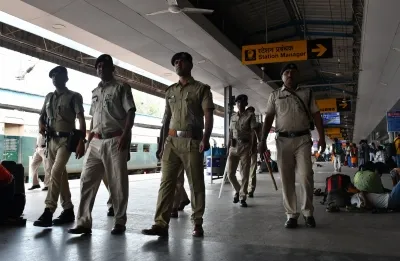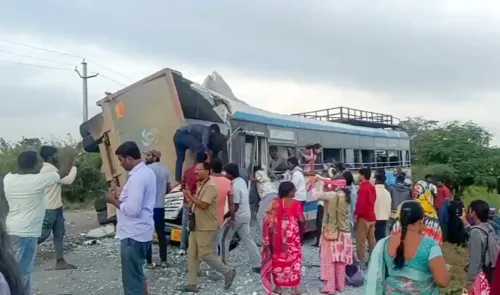Unauthorized Migration from Bangladesh and Myanmar Transforming the Demographics and Politics of Delhi: JNU Analysis

Synopsis
Key Takeaways
- Significant rise in Muslim population due to illegal migration.
- Political patronage facilitates the influx of undocumented migrants.
- Strain on Delhi's public infrastructure and resources.
- Illegal immigration fosters criminal activities.
- Unauthorized settlements lead to environmental degradation.
New Delhi, Feb 3 (NationPress) A fresh report from Jawaharlal Nehru University (JNU) has brought to light the profound effects of illegal migration from Bangladesh and Myanmar on the socio-political, economic, and demographic landscape of Delhi-NCR.
The 114-page analysis, titled 'Illegal Immigrants to Delhi: Analysing Socio-economic and Political Consequences', indicates that political influence is a key factor in the ongoing influx of undocumented migrants, primarily from Bangladesh and Myanmar, which includes Rohingya refugees.
Findings reveal that this illegal immigration has resulted in a significant increase in the Muslim population in the area, further altering the city’s socio-political landscape. The report suggests that the presence of these migrants has disrupted the local economy and strained available resources.
Specifically, it highlights the competition for employment in low-wage sectors, such as construction and domestic services, where migrant labor has led to reduced wages, while their exclusion from the tax system adds pressure on the legitimate workforce.
The report also emphasizes the intense pressure placed on Delhi’s public infrastructure, which includes healthcare, education, water, and electricity.
Unauthorized settlements have resulted in overcrowded neighborhoods and unplanned urban growth, exacerbating environmental issues.
The report states, “Illegal immigration to Delhi has dramatically changed the city’s demographic profile, with a substantial number of migrants arriving from neighboring countries like Bangladesh and Myanmar. These individuals frequently settle in congested areas such as Seelampur, Jamia Nagar, Zakir Nagar, Sultanpuri, Mustafabad, Jafrabad, Dwarka, Govindpuri, and others, where they strain resources and disrupt local social harmony.
The arrival of these migrants is often facilitated by brokers and agents who assist them in crossing borders, providing counterfeit identification documents for a fee. This practice undermines legal frameworks and electoral integrity, enabling many migrants to obtain fraudulent voter registrations.
The report further notes, “The environmental repercussions of migrant settlements encompass unchecked waste disposal, which leads to pollution and health risks. The involvement of migrants in informal housing markets has resulted in the emergence of unsafe and unauthorized housing, jeopardizing the safety of both inhabitants and the environment.”
“Illegal immigration has fueled the growth of criminal networks that exploit vulnerable migrants for activities such as smuggling and trafficking,” it adds.
According to the report, political patronage has been vital in facilitating migration. “Intelligence reports indicate that local political figures in West Bengal have issued citizenship documents to migrants, thus creating a captive voting bloc.”
It also clarifies that attempts to deport illegal immigrants are frequently hampered by bureaucratic hurdles and a lack of cooperation from the migrants’ home countries, alongside the administrative challenges faced by Delhi's National Capital Territory.









